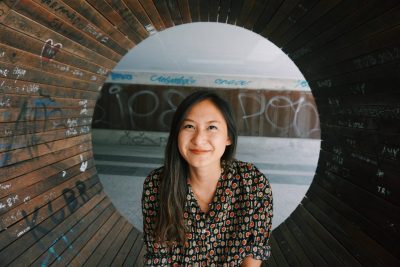Vicky Tran is a Junior Policy Analyst in the Education Branch at Indigenous Services Canada.
What attracted you to the BPAPM degree?

Vicky Tran in Ottawa.
Growing up, I always knew that I had a passion for connecting with people and supporting others. I had considered a degree in international development, but realized, after years of volunteering in my own school and community, that I had a strong desire to work and contribute in a more local context.
I also considered pursuing a degree in social work for its practical and direct impact on others, but understood that policy plays an important role in the availability of and access to services. I had a particular interest in mediating the interplay and tension between policy and practice.
When I saw that BPAPM had a specialization in social policy, I realized I could bring these two interests together and explore both.
What was your specialization like?
It was interdisciplinary, allowing me to choose courses in law, social work, economics, statistics, sociology, policy, and business. The program’s structure taught me how to look at a particular issue from multiple perspectives and discipline areas. I developed critical analysis skills, good writing, the ability to research, and an understanding of the policy process, all of which framed and supported the work I did in all my professional positions.
The program also allowed me to take up a minor in communication studies as well as enroll in co-op.
What does your job entail?
I work on strategic policy and planning in the area of education. Part of my role is to support engagement initiatives and build working relationships with First Nations partners. I help in the coordination and collaboration of education policy development.
How did you find a position in the public service?
I joined the public service through the Federal Student Work Experience Program (FSWEP), which places students in federal government departments, and the co-op program offered through Carleton University.
Through FSWEP and co-op, I joined the public service as a Media Monitor at the Department of Finance, a bilingual interpretive guide in France for the Department of Veterans Affairs, and a Junior Policy Analyst for the Department of Indigenous Services Canada.
What advice would you offer current students who are interested in a public policy career?
I would say take advantage of every opportunity that you have as a student, regardless of however long it might take you to graduate. It’s not about a race to the finish line or coming in first. Sign up for opportunities like the Federal Student Work Employment Program, co-op, internships, travel exchanges, and extracurriculars that get you excited. Getting a degree is only one of the many things you can accomplish as a student.
Beyond receiving a paper at the end of graduation, school is about meeting new people, learning new things about yourself and others, travelling to new places, saying yes to experiences that might scare you and hopefully understanding what brings you joy. These things will serve you just as well as your degree in pursuing a career in public policy or any other field.
This story was originally published on the FPA website.